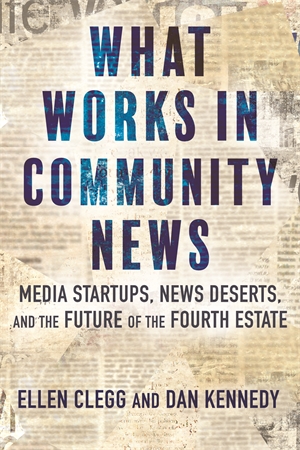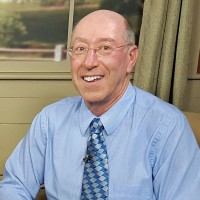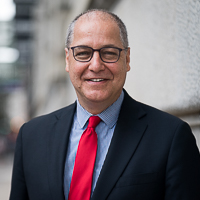
The Buell Media Center, home of The Colorado Sun. Photo (cc) 2021 by Dan Kennedy.
Of all the alarms that have been sounded over the decline of local news, perhaps none was louder than the one in Denver, Colorado, five years ago this month. In what became known as the Denver Rebellion, editorial page editor Chuck Plunkett wrote a front-page editorial calling for the Post’s hedge-fund owner, Alden Global Capital, to sell the paper to local interests. Plunkett wrote:
We call for action. Consider this editorial and this Sunday’s Perspective offerings a plea to Alden — owner of Digital First Media, one of the largest newspaper chains in the country — to rethink its business strategy across all its newspaper holdings. Consider this also a signal to our community and civic leaders that they ought to demand better. Denver deserves a newspaper owner who supports its newsroom. If Alden isn’t willing to do good journalism here, it should sell The Post to owners who will.
Unfortunately, Alden did not sell; after all, there were still profits to be squeezed out. At one time, the Post employed a newsroom of about 300 people, and its competitor, the Rocky Mountain News, had another 300. But the Rocky was shut down by a different chain owner years ago, and by the time that Plunkett wrote his manifesto, Alden was in the process of downsizing the Post again, from about 100 journalists to 60.
But journalism in Denver survived. Earlier this month, Plunkett wrote an opinion piece for The Colorado Sun looking back on the past five years. The Sun grew out of the Post: 10 senior people left after the rebellion and launched a digital-only news project that has grown to a couple of dozen people. This time around, Plunkett, now at the University of Colorado in Boulder, took a more optimistic view:
So much new talent has bubbled up around us as a result it’s difficult to keep track. The legislature’s got more reporters than you shake a stick at. Who could deny the excellence and the ambition of presenting and covering Denver’s recent mayoral debates?…
Hey, it’s heartening to see media companies banging around like they want to fight. Think of how bad off we’d be if we didn’t have such energy.
What’s happened in Colorado led Ellen Clegg and me to include it in our book, “What Works in Community News,” which will be published by Beacon Press early next year. I visited the Denver area in September 2021 and learned that the metro region is being well served. The Sun, the Post, Colorado Public Radio and another startup, The Denver Gazette, were all doing good work.
The problem, though, was in those places that weren’t within commuting distance of Denver. The news deserts that exist in the rural parts of the state were why The Colorado Sun was trying to provide some statewide coverage rather than merely focusing on Denver. So it was heartening to see that several papers whose owners wanted to move on have been acquired by a small chain. The indefatigable Corey Hutchins of Colorado College reports that O’Rourke Media Group, based in Arizona, is the new owner of Colorado papers in Salida, Buena Vista, Leadville, Park County and Fairplay.
“I feel like I’m taking over newsrooms that are well resourced,” the chain’s CEO, Jim O’Rourke, told Hutchins. “I like that, because that gives us an opportunity to come in and work with this team on things that we can do differently moving forward — things that we could do to help. And it’s better starting from a position like this versus going into a totally distressed situation where the previous company gutted the place.”
The news desert problem is real. But what’s happened in Denver and, now, in rural Colorado demonstrates what I’ve seen since I started reporting on the local news crisis some 15 years ago: Where there is failure there is also opportunity.
More: Ellen and I recently interviewed former Denver Post editor Greg Moore on our podcast, “What Works: The Future of Local News.” And in June 2021, I wrote about how 24 weekly and monthly papers in the Denver suburbs were saved through an effort that included The Colorado Sun.



 Ellen Clegg and I are thrilled to go public today with our book,
Ellen Clegg and I are thrilled to go public today with our book, 



